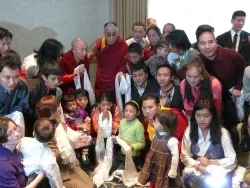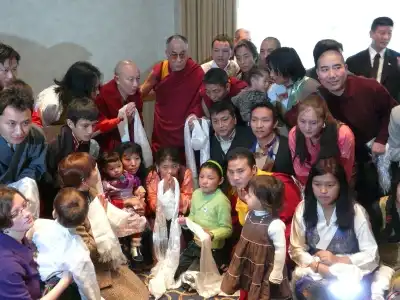In 1993, His Holiness the 14th Dalai Lama, Tenzin Gyatso, graced Poland with his presence for the first time, having been invited by Helsinki Foundation for Human Rights. During that first visit His Holiness the Dalai Lama was asked about the way in which Polish government and Poles could support Tibet and, without hesitation, he request help in educating Tibetans in Poland. The Polish government immediately responded to the request of His Holiness the Dalai Lama and funded the first scholarships for Tibetans one year later. Thanks to the Polish government, many goodwill people and Tibet support organizations, first Tibetans (one Tibetan language teacher and three students) arrived at the newly democratic Poland in 1993. They came in order to continue their education in Polish colleges. Those were the origins of the Tibetan community in the Republic of Poland. Since 1993, His Holiness The Dalai Lama has visited Poland three times: in 2005, 2008 and at the end of July 2009 when he received the honorary citizenship of Warsaw. When His Holiness visits Poland and has a private audience with Tibetans he always expresses his respect and recognition for the Polish nation, which survived 123 difficult years of the Partitions and finally became fully independent in 1989. The year of 1989, when the Third Republic of Poland was born, was also very memorable and happy for Tibetans because it was the year when His Holiness the Dalai Lama was awarded the Nobel Peace Prize in spite of the protest of the Chinese authorities.
As a naturalized Varsovian (I have lived in Poland for 15 years and in Warsaw for 14 years) I would like to thank Warsaw officials warmly for the decision to award His Holiness the Dalai Lama honorary citizenship in 2009.
Since 1994, more Tibetans have moved to Poland. Some of them have come because they wanted to continue their education, some because they have been relatives of Polish citizens. At the moment the Tibetan community in Poland is comprised of 17 people (12 men and 5 women). The biggest number of Tibetans, about 20, lived in Poland in 2005 and 2006. Unfortunately, some of them have moved back to India and Nepal and some, like many Poles, have left for the West after Poland joined the European Union in 2004.
My several friends and I work for Polish employers as: the Doctor of Philosophy in Buddhist Studies in the Departments of Oriental Studies of the University of Warsaw and Adam Mickiewicz University in Poznań, a trainee in family medicine in the Central Teaching Hospital (CSK) on Banacha Street in Warsaw and also in the non-public health care center run by Caritas of the Diocese of Warsaw-Praga, an electronics engineer in LG, a Tibetan language teacher in the community school at 20 Raszyńska Street in Warsaw and a bartender in Dziki Ryż restaurant in Warsaw. Some members of the Tibetan community study in colleges and high schools and some run their own businesses (a clinic of Tibetan herbal medicine, a Tibetan shop) and thus they promote the Tibetan culture and traditions. Unfortunately, several people do not have permanent jobs, mainly because they do not speak Polish.
I am very grateful to Poles for the kind help they have given to me and also to other Tibetans. Their help has sometimes been expensive – I mean scholarships, of course. I owe everything I have achieved in my adult life to Poland. For a year I have been a Polish citizen. I feel honored but also obliged to serve Poland and Poles as well as I can. I am sure that my six fellow countrymen who are also Polish citizens think in a similar way.
There is no doubt that Polish language is very difficult but for me, personally, it is extremely interesting and I still enjoy learning it. I completed medical studies in Polish and now I work as a family doctor in Poland. I wouldn't be able to work as a doctor if I didn't speak Polish well. However, many of my friends have problems with the language. The truth is that you can't learn a language on your own. Even though it is not difficult for a Tibetan to pronounce Polish words because the basic sounds of Tibetan are similar to the sounds of Polish it is very hard to form a more or less logical sentence if you don't know the elementary grammar rules.
The Tibetan community association has been functioning in Poland for about 3 years. Unfortunately, the association is still unofficial. Its main objectives are:
1.to cultivate and promote the Tibetan culture and traditions and also the Tibetan heritage
2.to promote the knowledge of Tibet and Tibetans in the Republic of Poland and beyond its borders
3.to work to the benefit of Tibetans in the Republic of Poland and beyond its borders
4.to work to the benefit of Tibet and realize all the suggestions and orders of His Holiness the Dalai Lama and also of the Tibetan Government in Exile
5.to act to the benefit of the Tibetan communities in other ways
6.to promote the idea of the international cooperation aiming at supporting Tibet and Tibetans in their attempts to become autonomous
All the Tibetans, except for one woman who studies in Cracow, live in Warsaw. We often meet but at the moment we don't have any permanent place to hold meetings. That's why the best places for meetings are at the moment: Acala Tibetan House in Stara Miłosna and Tibetan Shop (40 Hoża Street). We often meet in the school at 20 Raszyńska Street where three Tibetan girls are studying. Thanks to the support and the kindness of the school's headmaster we can hold various special events there. This school really supports Tibet and Tibetans.
Text by Yeshi Lhosar
Translated by Krystyna Szurmańska










